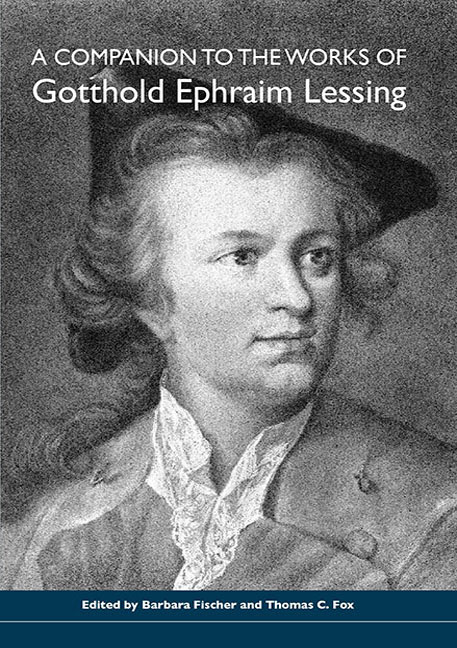Book contents
- Frontmatter
- Contents
- List of Illustrations
- Acknowledgments
- Lessing Editions and Abbreviations
- Selected Works by Lessing
- Introduction
- Lessing's Life, Work, and Times
- Criticism and Aesthetics
- Philosophy and Theology
- Drama and Drama Theory
- Reception
- Lessing and the Third Reich
- Lessing on the German-Speaking Stage in the Federal Republic of Germany, Austria, and Switzerland, 1945–1990
- Lessing on the East German Stage and Screen
- Modern Criticism in Historical Context: 200 Years of Lessing Reception
- Contact Organizations
- Works Cited
- Notes on the Contributors
- Index
Modern Criticism in Historical Context: 200 Years of Lessing Reception
from Reception
Published online by Cambridge University Press: 28 April 2017
- Frontmatter
- Contents
- List of Illustrations
- Acknowledgments
- Lessing Editions and Abbreviations
- Selected Works by Lessing
- Introduction
- Lessing's Life, Work, and Times
- Criticism and Aesthetics
- Philosophy and Theology
- Drama and Drama Theory
- Reception
- Lessing and the Third Reich
- Lessing on the German-Speaking Stage in the Federal Republic of Germany, Austria, and Switzerland, 1945–1990
- Lessing on the East German Stage and Screen
- Modern Criticism in Historical Context: 200 Years of Lessing Reception
- Contact Organizations
- Works Cited
- Notes on the Contributors
- Index
Summary
The reception of lessing, of his works and ideas, has been marked for 200 years by attempts to place him historically somewhere between the classic and the modern, between national literature and world literature, between literary history and art theory, and to judge whether he was an innovator and a mediator of new developments. His contested place in German literary and intellectual history has often served to define German culture at the crossroads between French and English models, between the Roman and the Greek traditions, between delayed and accelerated progress toward modernization. While German culture generally lagged behind English and French developments, mostly due to the devastating aftermath of the Thirty Years’ War, German intellectuals such as Winckelmann, Lessing, Kant, Herder, Goethe, and Schiller, as individuals, pushed the emerging German culture to join and in some cases even spearhead European advances. It was Lessing who, on the one hand, brought such authors as Aristotle and Diderot to German readers, and who, on the other, was the first German author to find a European audience. It was mainly through Lessing that German literary culture arrived on the European stage.
As a result of this Janus-like nature of his various roles, Lessing's reputation at any given time has always been subject to difficulties in affirming his historical place and defining his theoretical significance. Lessing has always been celebrated as a pioneer in literary criticism, art history, critical theology, and drama, but in some areas, which are the focus of attention in current debates of literary and cultural theory, his contributions have gained new poignancy. But while, at least in the English-speaking world, the focus may be shifting back and forth between the author of Nathan der Weise (Nathan the Wise, 1779) and the author of Laokoon (Laocoon, 1766), between cultural communication and textual representation, Lessing's historical place as a “classical modernist” remains uncontested in many areas:
• In terms of intellectual history, it was Lessing, in journalistic collaboration with his friends Moses Mendelssohn and Friedrich Nicolai, who raised criticism to the level of public discourse, thus inspiring the heated discussion of literary and philosophical issues, which became the preferred area of bourgeois emancipation and identification.
- Type
- Chapter
- Information
- A Companion to the Works of Gotthold Ephraim Lessing , pp. 327 - 350Publisher: Boydell & BrewerPrint publication year: 2005



